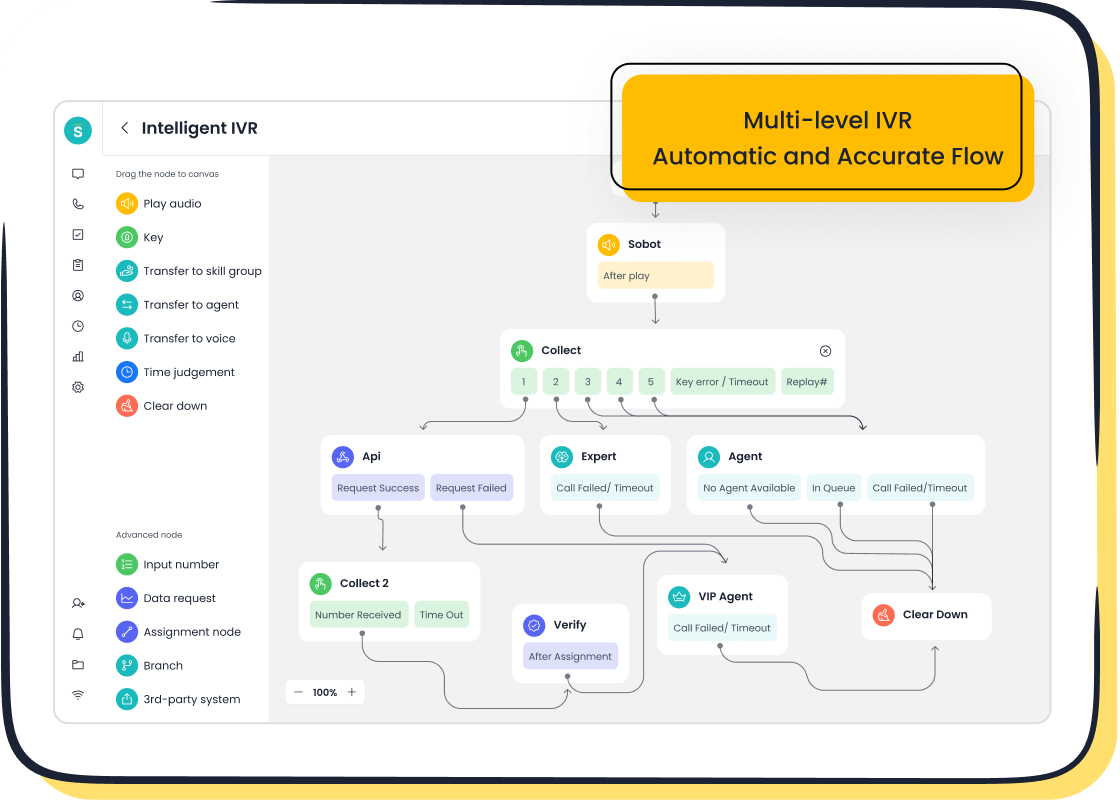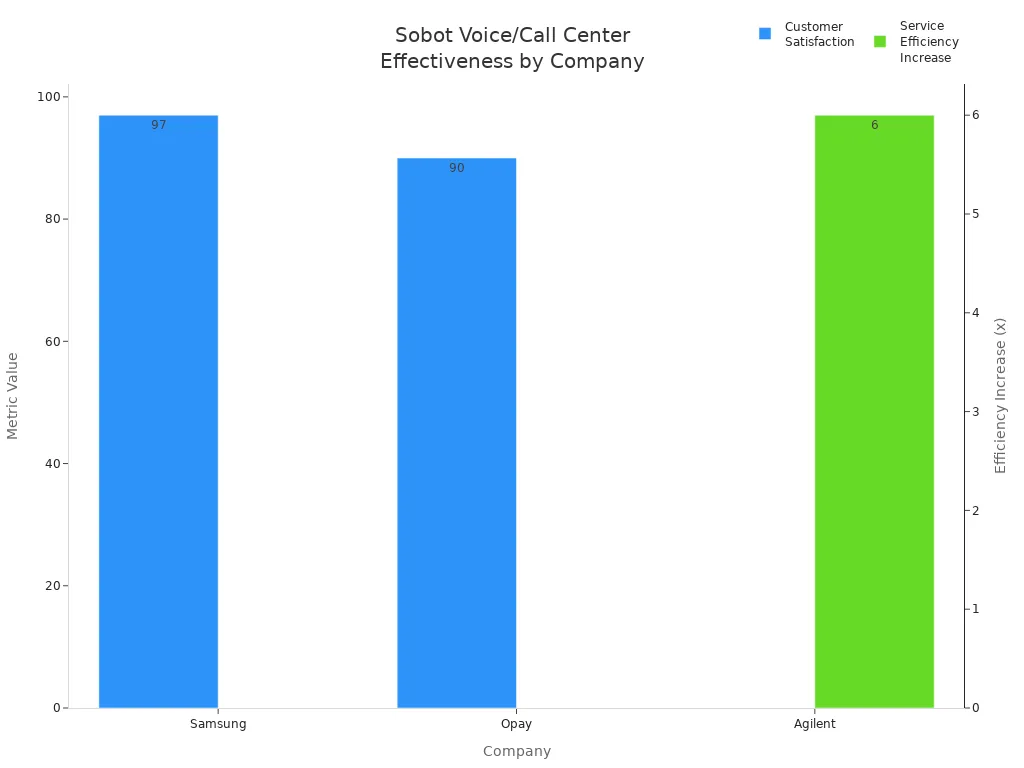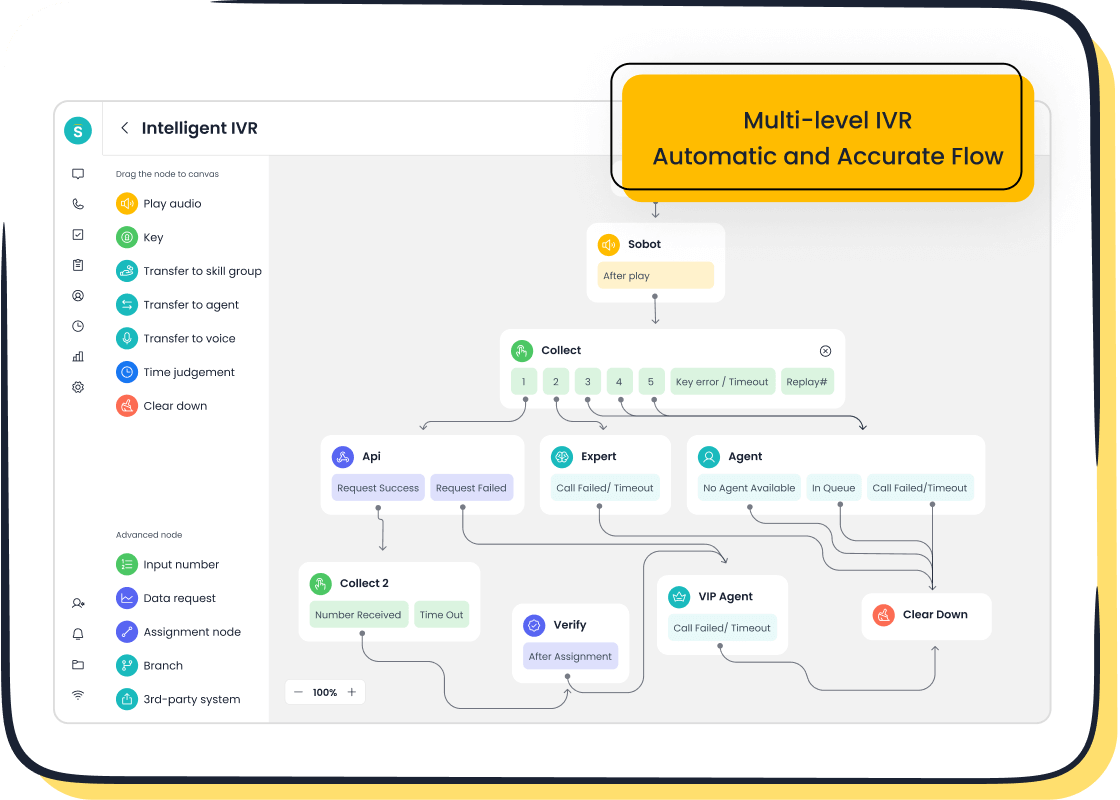Best Software to Boost Call Center Productivity Compared

Industry analysts recognize Sobot and AmplifAI Voice/Call Center as leading call center productivity software. Sobot call center solutions drive productivity by reducing average handle time, improving first call resolution, and empowering agents with Sobot AI-driven features. Companies like American Express and T-Mobile have seen measurable gains in efficiency and customer satisfaction using advanced call center tools. Sobot AI offers a unified workspace and intelligent routing, helping businesses manage calls and customer data with ease. Selecting the right call center tools, like Sobot, ensures higher call center productivity, better customer experience, and sustained business growth.
Top Call Center Productivity Tools

Leading Solutions Overview
Businesses today rely on advanced call center tools to improve customer service and drive productivity. The most widely adopted call center productivity tools in 2024 feature AI-powered chatbots, voice assistants, interactive voice response (IVR), sentiment analysis, call recording, automatic ticket creation, and quality assurance. These tools help companies manage high call volumes, reduce agent workload, and deliver faster resolutions.
Note: North America leads the market for call center tools, holding 36.92% of the global share in 2024. However, adoption is growing rapidly in other regions as well.
The following list highlights the most popular call center tools and their core capabilities:
- AI-powered contact center software solutions that include chatbots and voice assistants for handling routine inquiries.
- Interactive Voice Response (IVR) systems that guide callers and route them to the right agent or department.
- Sentiment analysis tools that monitor customer emotions during calls to improve service quality.
- Call recording and transcription tools that support compliance and agent training.
- Automated ticket creation and quality assurance tools that streamline workflows and ensure consistent service.
Large enterprises dominate the market, but small and medium businesses are quickly adopting cloud-based call center tools for their flexibility and scalability. The rise of AI and machine learning has enabled real-time insights, personalized customer interactions, and smarter call routing. Companies now use these tools to boost agent productivity, reduce average handle time, and improve customer satisfaction.
The deployment models for these tools vary. Most businesses prefer cloud-based solutions for their scalability, flexibility, and rapid deployment. Cloud models allow agents to access platforms from anywhere, making remote work possible. Hybrid models combine on-premise and cloud features, offering security for sensitive data and the benefits of cloud innovation. On-premise solutions remain in use for organizations with strict data control needs, but they require more IT resources and have slower scalability.
Integration is a key factor in the effectiveness of call center tools. Leading solutions offer seamless integration with CRM systems like Salesforce and HubSpot, helpdesk and ticketing platforms, workforce management tools, and analytics platforms. These integrations enable automated workflows, real-time analytics, and unified customer journeys, which enhance both agent and customer experiences.
| Platform | Key Differentiating Features | Benefits / Differentiators |
|---|---|---|
| TalkDesk | Cloud-based, AI enhancements, multi-channel communication, customizable AI apps, workforce management | Easy implementation, scalable, AI-powered agent assistance, personalized workflows |
| Genesys Cloud | Experience-as-a-Service, native CRM integrations, AI-powered agent assistance, flexible inbound/outbound tools | Unified agent portal, automated workflows, scalable customer engagement |
| Aircall | Call routing, IVR, call recordings/transcriptions, collaboration tools like shared inbox and contacts | Enhances internal communication, real-time updates, global virtual call centers |
| NICE CXone | Automatic call distribution, predictive dialers, workforce management, conversational AI | Optimizes agent bandwidth, filters simple queries with self-service, enhances digital CX |
| Five9 | Multi-channel support, skill-based routing, conversational AI self-service, workforce optimization | Seamless customer experience, virtual agents free bandwidth, real-time data collection |
| Dialpad | AI-powered live sentiment analysis, IVR, routing, automated workflows | Real-time agent support, personalized customer interactions |
| uContact | Voice and text messaging, WhatsApp integration, IVR, auto-dialers, workforce management, shared inboxes | Customizable platform, supports inbound/outbound/blended calls, enhances agent collaboration |
| LeadSquared | CRM integration, intelligent call routing, real-time dashboards | Streamlines workflows, boosts agent productivity, lacks AI/ML features currently |
| CloudTalk | AI-accelerated routing, call prioritization, call notes, tagging, scripts | Personalizes agent experience, improves team communication |
These platforms share several key features that set them apart:
| Key Feature | Description | Benefit / Differentiator |
|---|---|---|
| Agent Self-Scheduling | Flexible, user-friendly interfaces for agents to manage shifts, swap, and request time off | Improves work-life balance, reduces managerial burden, supports engagement and reduces attrition |
| Call & Interaction Recording | 100% call recording with AI-driven transcription, search, and CX analytics integration | Enables comprehensive analysis, compliance, and quality improvement |
| AI-Powered Interaction Summary | Automated, concise summaries of calls to reduce after-call work | Saves agent time, improves accuracy, ensures consistent follow-up |
| Automated Quality Management | AI analyzes all interactions to identify trends and provide targeted feedback | Ensures consistent quality, accelerates upskilling, drives customer loyalty |
| Interaction Analytics | Combines voice, text, desktop, and process data with sentiment analysis and customizable dashboards | Unlocks actionable insights to improve CX and agent performance |
| Business Intelligence & Reporting | Real-time KPI monitoring with self-service reporting accessible to non-technical users | Fosters a data-driven culture, empowers managers and agents |
| Cloud-Based Omnichannel Comm. | Unifies all customer touchpoints (phone, social media, etc.) into a seamless experience | Enhances customer experience and operational efficiency |
| Advanced Routing Features | Skills-based routing, priority queuing, AI-powered call distribution | Optimizes call handling and agent utilization |
| Workforce Management | AI-driven forecasting, real-time adherence, self-service reporting | Balances staffing with demand, improves efficiency and employee satisfaction |
| CRM Integration | Provides a 360-degree customer view | Enhances personalized support |
| AI Chatbots & Virtual Agents | Automate routine interactions using conversational AI | Frees agents for complex issues, improves efficiency and customer satisfaction |
| Knowledge Base Management | AI-powered search and content analytics for centralized information | Supports faster resolution and consistent answers |
| Customization & Scalability | Easy to customize, scalable platforms with multi-channel support and collaboration features | Enables flexibility and adaptability to business needs |
Call center tools continue to evolve, with AI and automation driving new levels of efficiency. Companies that invest in these tools see measurable improvements in call center productivity, agent satisfaction, and customer loyalty.
Why Sobot Voice/Call Center Stands Out
Sobot Voice/Call Center has emerged as a leader among call center tools, offering a unique blend of stability, innovation, and user-friendly design. Sobot guarantees 99.99% uptime, providing a reliable platform for businesses of all sizes. The system supports global phone numbers from over 100 countries, making it ideal for companies with international operations.
Sobot’s all-in-one agent workspace boosts reception efficiency by 48%. Agents can manage calls, access customer data, and collaborate with team members from a single dashboard. The platform’s intelligent IVR, automatic call distribution, and AI-powered voicebots streamline both inbound and outbound call processes. These features help companies achieve a 54% increase in first-contact resolution rates and a 41% reduction in average handle time.
Tip: Sobot’s fast API integration allows businesses to deploy the system in as little as 10 minutes, minimizing downtime and speeding up onboarding.
Sobot stands out for its seamless integration with CRM and technology management systems. This capability enables companies to centralize customer data, automate workflows, and personalize every interaction. The platform also offers strong data security, with encrypted data transfer and compliance with global data protection laws.
Sobot’s mobile app for Android and iOS lets agents handle calls on the go, ensuring flexibility and responsiveness. The platform’s real-time dashboards, call monitoring, and AI Copilot assistance provide managers and agents with actionable insights to improve performance.
Sobot’s flexible licensing models, including SaaS rental options, make it accessible for businesses with different needs and budgets. Customers across industries—from retail and finance to manufacturing and life sciences—praise Sobot for its stability, powerful service, and ability to track the entire service process.
Real-World Impact
Sobot’s effectiveness is evident in its customer success stories. Agilent, a global leader in life sciences and diagnostics, achieved a sixfold increase in customer service efficiency and a 25% reduction in costs after implementing Sobot’s omnichannel solution. The company also reached a 95% customer satisfaction score. Samsung reported a 97% CSAT after adopting Sobot’s all-in-one solution, while Opay achieved 90% customer satisfaction with Sobot’s voice integration.

Sobot’s AI-powered voicebots handle routine inquiries, take customer orders, answer common questions, and provide after-hours support. This reduces agent workload and errors, improves satisfaction, and ensures continuous customer assistance. Companies also use Sobot to handle complaints, collect feedback, and drive up-selling and cross-selling opportunities.
Sobot’s platform supports a wide range of integrations, including CRM systems, helpdesk and ticketing tools, workforce management solutions, cloud calling platforms, and analytics tools. These integrations enable automated workflows, real-time analytics, and unified customer journeys, enhancing both agent productivity and customer experience.
Note: Sobot’s global network includes 110 points of presence in 93 cities across 50 countries, ensuring fast and stable connections for businesses worldwide.
Sobot Voice/Call Center delivers a stable, powerful, and easy-to-integrate solution for modern businesses. Its unique features, proven results, and customer-centric design make it a top choice for organizations seeking to maximize call center productivity and deliver exceptional customer service.
Call Center Tools Comparison
Features and Integrations
Call center performance management software offers a wide range of features that support productivity, quality, and engagement. Businesses select call center tools based on their size and operational needs. Small businesses often focus on essential features like call routing, CRM integrations, and basic performance dashboards. Mid-sized and enterprise organizations require advanced tools such as AI-powered insights, omnichannel support, predictive dialers, and workforce management.
Cloud-based call center performance management software provides rapid deployment and seamless integration with existing systems. This flexibility allows companies to scale quickly and adapt to changing needs. Leading tools include AI-driven automation, call recording, IVR, analytics, and workforce management. Integration with CRM and helpdesk platforms, such as Salesforce and HubSpot, enables unified customer data and streamlined workflows. Real-time dashboards and performance tracking help managers monitor agent performance and drive improvement.
| Feature | Small Business | Mid-sized Business | Enterprise |
|---|---|---|---|
| Call routing | Essential | Essential | Essential |
| IVR & auto attendants | Recommended | Essential | Essential |
| AI-powered insights | Optional | Recommended | Essential |
| Omnichannel support | Optional | Recommended | Essential |
| Predictive dialer | Not needed | Recommended | Essential |
| CRM integrations | Essential | Essential | Essential |
| Advanced analytics | Optional | Recommended | Essential |
| Workforce management | Not needed | Recommended | Essential |
Sobot’s call center performance management software stands out with its intelligent IVR, unified workspace, and global telephony. The platform’s seamless integration with CRM systems and real-time performance dashboards supports continuous improvement and agent engagement.
Pros and Cons
Call center tools deliver many benefits for businesses seeking improvement in quality, productivity, and engagement. Most tools automate repetitive tasks, support multi-platform communication, and provide robust analytics for performance tracking and quality assurance. These features help drive agent productivity and ensure high-quality customer interactions.
Many users praise the ease of use, automation, and strong customer support found in leading call center performance management software.
However, some tools present challenges. Pricing complexity, limited customization, and integration gaps can affect the user experience. Usability issues in dashboards or reporting may slow down performance improvement efforts. Outsourcing certain functions may also introduce hidden costs and quality control concerns.
-
Advantages:
- Automation of routine tasks
- Real-time performance dashboards
- Comprehensive workforce management
- Enhanced agent performance tracking
- Improved quality assurance and reporting
-
Disadvantages:
- Pricing complexity
- Limited customization in some tools
- Integration gaps with legacy systems
Sobot addresses these challenges by offering a stable, scalable platform with easy integration, advanced analytics, and a focus on continuous improvement in agent performance and quality.
Call Center Performance Management Software

Analytics and Reporting
Call center performance management software empowers organizations to drive improvement through robust analytics and reporting. These platforms deliver performance dashboards that visualize key performance metrics, such as first call resolution, talk time, and abandonment rates. Supervisors and managers use these dashboards to track agent performance and identify trends that impact quality and workforce efficiency.
| Software | Analytics & Reporting Features | Limitations & Notes |
|---|---|---|
| Calabrio ONE | Real-time dashboards, AI sentiment scoring, call transcription, customizable KPIs, trend analysis | Alerts basic, lacks intelligent coaching nudges, gamification requires external tools |
| Talkdesk | Real-time agent/supervisor dashboards, AI automation, quality management | Coaching manual/template-driven, siloed WEM data, no coaching effectiveness index |
| Avaya Experience | Historical dashboards, role-based views, custom KPI tracking | No AI-driven coaching, no auto QA or sentiment scoring, limited gamification |
| Verint | Granular KPI tracking, voice transcription, interaction analytics, live dashboards | No unified real-time performance data layer, manual coaching workflows, siloed gamification |
Performance dashboards in call center performance management software offer both real-time and historical reporting. These tools provide visual wallboards for supervisors and agents, making performance tracking simple and actionable. Advanced analytics features, such as predictive analytics, forecast call volumes and customer behavior, supporting workforce management and financial planning. Descriptive analytics help teams analyze past data for continuous improvement, while machine learning automates routine tasks and personalizes agent feedback.
Sobot’s call center performance management software integrates analytics and reporting with CRM systems, unifying data for actionable performance insights. This approach enables organizations to measure quality, monitor workforce productivity, and drive performance improvement across all channels.
Real-Time Monitoring
Real-time monitoring stands as a cornerstone of call center performance management software. Supervisors gain instant visibility into agent performance, call queues, and customer interactions through live dashboards. These dashboards display performance metrics such as wait times, occupancy, and service levels, allowing for immediate intervention and improvement.
- Real-time dashboards for monitoring agent performance and call queues
- Live call monitoring with whisper coaching for on-the-spot training
- AI-powered live transcription and sentiment analysis for quality assurance
- Real-time alerts and agent assist features for contextual tips during calls
- Automated quality scoring and compliance tracking
- Integration with CRM and workforce management systems for enhanced performance tracking
Performance dashboards in these solutions provide real-time feedback, enabling supervisors to support agents during calls. Features like sentiment analysis and customizable alert thresholds help prevent negative experiences and reduce escalations. For example, a healthcare provider reduced escalations by 27% using real-time monitoring, while an e-commerce company lowered abandoned calls by 20%. These improvements demonstrate the value of continuous performance tracking and quality assurance.
Sobot’s call center performance management software offers real-time monitoring tools that empower supervisors to deliver immediate coaching and support. This leads to measurable improvement in agent performance, customer satisfaction, and overall service quality. Performance insights from real-time monitoring help organizations refine workforce management strategies and achieve ongoing performance improvement.

Sobot Voice/Call Center Features
Intelligent IVR
Sobot’s Intelligent IVR system transforms how businesses handle inbound calls. The platform allows companies to customize greetings, build call menus, and route calls to the right agents or teams. The drag-and-drop interface makes setup simple and fast. Sobot’s IVR supports global telephony, so businesses can serve customers worldwide without extra complexity. Intelligent IVR reduces wait times and improves customer satisfaction by guiding callers quickly to the right solution. Companies see a direct boost in call center performance management software results, with higher first-contact resolution rates and lower abandonment rates. Sobot’s IVR adapts to business needs, supporting both simple and complex workflows.
Unified Workspace
Sobot’s Unified Workspace brings all customer interactions into one place. Agents can manage calls, messages, and tickets from a single dashboard. This workspace uses AI-powered responses to automate routine tasks and improve agent productivity. The ticketing system tracks customer issues, while rule-based triggers automate workflow steps. Multi-language support helps agents serve customers from different regions.
After adopting Sobot, one client reported an 80% reduction in response time and a 20% increase in agent efficiency. The omnichannel solution combines self-service, conversational support, and ticketing, which boosts engagement and agent productivity.
The Unified Workspace supports call center performance management software by making it easier for supervisors to monitor agent engagement and track key metrics.
- AI-powered responses automate routine interactions.
- Ticketing system organizes and tracks issues.
- Rule-based triggers streamline workflows.
- Multi-language support handles diverse queries.
AI-Powered Voicebot
Sobot’s AI-Powered Voicebot acts as a virtual agent, handling high volumes of inbound calls. The voicebot understands and responds to customer questions, solves problems, and performs transactions. It provides self-service options like information consultation, account inquiry, and simple business processing. This reduces customer wait times and improves satisfaction. The AI Copilot feature supports human agents by offering real-time suggestions, post-call summaries, and automatic ticket creation. For managers, AI features deliver customer insights, trend forecasting, and quick report generation. These tools help businesses get the most from their call center performance management software, driving engagement and agent productivity.
Agilent, a global leader in life sciences, saw a sixfold increase in service efficiency and a 25% cost reduction after implementing Sobot’s solution. Their customer satisfaction score reached 95%, showing the real impact of advanced call center performance management software.
Choosing the Right Call Center Productivity Solution
Key Selection Criteria
Selecting the right call center productivity solution requires careful evaluation of several factors. Businesses should start by matching the size of the call center with their own operations. A small business may not need the same scale of tools as a global enterprise. Future expansion matters as well. Companies should choose vendors that can grow with them, ensuring long-term improvement and avoiding costly migrations.
A strong track record and relevant industry experience help guarantee consistent quality and performance. Vendors with comprehensive training programs support agent productivity and engagement from day one. Security and cloud deployment options play a key role, especially for organizations handling sensitive data. Cost transparency is essential. Companies should compare pricing structures to avoid hidden fees.
| Criteria | Why It Matters |
|---|---|
| Size & Scalability | Prevents inefficiency and supports growth |
| Industry Experience | Ensures quality and regulatory compliance |
| Training & Support | Boosts agent productivity and engagement |
| Technology & Security | Protects data and ensures reliability |
| Cost Structure | Avoids surprises and supports budgeting |
| Global Reach | Supports diverse customer bases |
Tip: Always confirm that the software integrates with existing CRM, helpdesk, and marketing tools to streamline workflows and improve customer experience management.
Matching Tools to Business Needs
Every organization has unique operational needs and goals. Companies should identify their main call types, agent count, and desired features such as intelligent routing or AI-powered voicebots. For example, Sobot’s omnichannel solution provides unified customer data, reducing repetitive conversations and improving resolution speed. This leads to measurable improvement in agent productivity and engagement.
Organizations in regulated industries must ensure tools support compliance evaluation forms and automate data collection. Performance dashboards and analytics help track key metrics like average handle time and first call resolution, driving continuous improvement. Workforce management features, such as forecasting and scheduling, ensure proper coverage and quality service during peak times.
- Use omnichannel tools to provide agents with consistent customer information.
- Automate routine tasks with chatbots and IVR to boost productivity.
- Monitor engagement and improvement through performance dashboards.
- Choose cloud-based solutions for scalability and reliable uptime.
- Ensure ongoing training and responsive support for long-term improvement.
By aligning tools with business needs, companies can achieve higher quality, better customer experience management, and sustained improvement in workforce engagement.
Organizations seeking to boost call center productivity should focus on tools that offer AI-driven analytics, seamless integration, and real-time monitoring. Sobot Voice/Call Center stands out with its unified workspace, global telephony, and proven efficiency gains. Companies benefit by following best practices:
- Assess multi-channel support
- Evaluate AI and automation
- Review scalability and security
Exploring a free trial or contacting Sobot helps teams make informed decisions for lasting improvement.
FAQ
What is call center productivity software?
Call center productivity software helps businesses manage customer calls, automate tasks, and track agent performance. Companies use these tools to reduce average handle time and improve customer satisfaction. Sobot offers advanced features like AI-powered voicebots and real-time analytics for better results.
How does Sobot improve call center productivity?
Sobot increases call center productivity by unifying customer data, automating routine tasks, and providing intelligent IVR. For example, Agilent saw a sixfold boost in efficiency and a 25% cost reduction after using Sobot’s call center productivity software.
Sobot’s 99.99% uptime ensures reliable service.
Can call center productivity software integrate with CRM systems?
Yes, most call center productivity software, including Sobot, integrates with popular CRM platforms. This integration allows agents to access customer information quickly and personalize service. Sobot’s seamless integration supports Salesforce, HubSpot, and other major systems.
What features should businesses look for in call center productivity software?
Key features include intelligent IVR, AI-powered voicebots, unified workspaces, real-time analytics, and global telephony.
Companies should also check for CRM integration, mobile compatibility, and strong security.
Sobot’s call center productivity software covers all these essentials.
Is call center productivity software suitable for small businesses?
Yes, small businesses benefit from call center productivity software by automating tasks and improving customer service. Sobot’s flexible SaaS model and easy deployment make it accessible for companies of any size.
Even small teams can see faster response times and higher customer satisfaction.
See Also
Effective Strategies To Enhance Call Center Monitoring Results
Best Call Center Analytics Tools To Use In 2024
Key Capabilities To Look For In CRM Call Software
Comprehensive Overview Of Omnichannel Solutions For Call Centers
